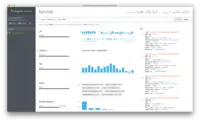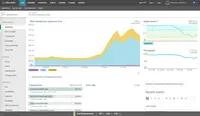Overview
What is MongoDB?
MongoDB is an open source document-oriented database system. It is part of the NoSQL family of database systems. Instead of storing data in tables as is done in a "classical" relational database, MongoDB stores structured data as JSON-like documents with…
Why is MongoDB good
MongoDB - A Stellar NoSQL Database
Perfect No SQL DB is here
The best no-sql DB to work with and to start in documented db world
Oleg's MongoDB review
Want to gain insights from unstructured data? This is the tool that everyone should use.
MongoDB by a front-end guy
No data relations, go MongoDB!
Stable & Easy to Use
No relation, no worry
MongoDB is the way to go!
One of the best nosql databases for web applications
MongoDB: King of NoSQL
MongoDB, a flexible/reliable DB that will draw you to the NoSQL world.
MongoDB, The ideal database for your projects in full JavaScript
Awards
Products that are considered exceptional by their customers based on a variety of criteria win TrustRadius awards. Learn more about the types of TrustRadius awards to make the best purchase decision. More about TrustRadius Awards
Popular Features
- Availability (38)9.797%
- Performance (38)9.090%
- Concurrency (38)8.686%
- Security (38)8.686%
Pricing
Shared
$0
Serverless
$0.10million reads
Dedicated
$57
Entry-level set up fee?
- No setup fee
Offerings
- Free Trial
- Free/Freemium Version
- Premium Consulting/Integration Services
Starting price (does not include set up fee)
- $0.10 million reads
Product Demos
MongoDB Change Streams: The Hidden Gem within the MongoDB Repertoire
MongoDB & Tableau FAA Demo
NoSQLMap MongoDB Management Attack Demo
Intro to MongoDB with C# - Learn what NoSQL is, why it is different than SQL and how to use it in C#
MongoDB with Python Crash Course - Tutorial for Beginners
Features
NoSQL Databases
NoSQL databases are designed to be used across large distrusted systems. They are notably much more scalable and much faster and handling very large data loads than traditional relational databases.
- 9Performance(38) Ratings
How fast the database performs under data load
- 9.7Availability(38) Ratings
Availability is the probability that the NoSQL database will be available to preform its function when called upon.
- 8.6Concurrency(38) Ratings
Concurrency is the ability for multiple processes to access or change shared data simultaneously. The greater the number of concurrent user processes that can execute without blocking each other, the greater the concurrency of the database system.
- 8.6Security(38) Ratings
Security features include authentication against external security mechanisms liker LDAP, Windows Active Directory, and authorization or privilege management. Some NoSQL databases also support encryption.
- 9.4Scalability(38) Ratings
NoSQL databases are inherently more stable than relational databases and have built-in support for replication and partitioning of data to support scalability.
- 9.1Data model flexibility(38) Ratings
NoSQL databases do not rely on rely on tables, columns, rows, or schemas to organize and retrieve data, but use use more flexible data models to accommodate the large volume and variety of data being generated by modern applications.
- 9.1Deployment model flexibility(37) Ratings
Can be deployed on-premise or in the cloud.
Product Details
- About
- Integrations
- Competitors
- Tech Details
- FAQs
What is MongoDB?
MongoDB's flagship Enterprise Advanced edition is a collection of products and services that drive security, efficiency, to put users in control of MongoDB Databases. These include:
- MongoDB Enterprise Server - the commercial edition of MongoDB, which includes additional capabilities such as in-memory storage engine for high throughput and low latency, advanced security features like LDAP and Kerberos access controls, and encryption for data at rest. Enterprise Server is included with the MongoDB Enterprise Advanced subscription, which includes expert assistance and tools. Or, the MongoDB Enterprise Server is also available free of charge for evaluation and development purposes.
- MongoDB Ops Manager - Tools for managing MongoDB in a secure, on-premise or owned environment. Available through the MongoDB Enterprise Advanced subscription, Ops Manager eliminates operational overhead by automating key administration tasks such as deployment, and upgrades. Tools also support monitoring with visualization of performance metrics, continuous or point-in-time incremental backup, and query optimization with the Visual Query Profiler.
- MongoDB Enterprise Kubernetes Operator - Kubernetes Operators are application-specific controllers that extend the Kubernetes API to create, configure, and manage instances of stateful applications such as databases. On self-managed infrastructure – whether on-premises or in the cloud – Kubernetes users can use the MongoDB Enterprise Operator for Kubernetes and MongoDB Ops Manager or Cloud Manager to automate and manage MongoDB clusters.
MongoDB is available as a managed cloud solution via MongoDB Atlas. But MongoDB Enterprise Advanced offers advanced access control and data security features to protect on-premise or private cloud databases, and satisfy compliance or customer requirements. It’s also designed to make it easy to integrate MongoDB with any existing security infrastructure and tooling.
Organizations from startups to the largest companies can use MongoDB's capabilities to create applications never before possible at a fraction of the cost of some legacy databases. The MongoDB database ecosystem boasts over 10 million downloads, thousands of customers, and over 1,000 technology and service partners.
Also, the MongoDB Community Edition is licensed under what the company provides as the Server Side Public License (SSPL), which is based on the GPL v3. All MongoDB Community Server patch releases and versions released on or after October 16, 2018, will be subject to this new license, including future patch releases of older versions. The Community version of the distributed database offers a document data model along with support for ad-hoc queries, secondary indexing , and real-time aggregations to provide ways to access and analyze data.
MongoDB Features
- Supported: Comprehensive monitoring for full-performance visibility
- Supported: Automated database management for 10-20x more efficient ops
- Supported: Fully-managed backup for peace of mind
MongoDB Screenshots
MongoDB Video
MongoDB Integrations
MongoDB Competitors
MongoDB Technical Details
| Deployment Types | Software as a Service (SaaS), Cloud, or Web-Based |
|---|---|
| Operating Systems | Unspecified |
| Mobile Application | No |
Frequently Asked Questions
Comparisons
Compare with
Reviews and Ratings
(432)Community Insights
- Business Problems Solved
- Recommendations
MongoDB has emerged as a popular choice for developers and organizations seeking a fast and efficient NoSQL data layer for their web applications. Its flexibility and iterative development capabilities have made it invaluable in various use cases. For example, MongoDB is being utilized by engineering departments to power SaaS platforms, allowing clients to create and configure assets for account-based marketing efforts. The document store of MongoDB proves ideal for handling complex configurations with nested structures. Additionally, the native JSON support is convenient and valuable when working with data needed in web browsers. MongoDB's aggregation framework enables the generation of complex reports and dashboard reports, which are immensely beneficial for businesses. The replication feature of MongoDB seamlessly allows applications to scale and support numerous clients, further enhancing its utility.
Furthermore, MongoDB has proven its worth as a temporary mid-size storage database for processing massive amounts of data per day and extracting notable events and records for further analysis. It facilitates quick application development in the cloud, enabling free usage and evaluation of system loads. Additionally, MongoDB serves as an internal database type in REST APIs for high-load applications. Compared to traditional SQL systems, MongoDB stands out due to its scalability and superior performance in terms of reads and writes. Its simplicity and clarity make it a preferred choice when dealing with large amounts of data. Furthermore, MongoDB is extensively used as the main storage technology for web development projects employing the MEAN Stack. Its scalability and unstructured document storage are particularly valued from a business perspective.
Moreover, MongoDB's non-relational nature simplifies database modeling and optimizes performance when working with JavaScript or JSON objects. It has been recognized for optimizing delivery time, making projects more feasible within specified timelines. MongoDB is widely employed as the main persistent datastore for SaaS offerings, providing robust and scalable solutions. It finds immense utility in large-scale, high-transaction environments as well by storing analytics information from social networking sites or serving as the primary datastore for Intranets. Additionally, MongoDB handles data with hundreds of variances effectively, which can be challenging to manage in a relational database. Its lightweight alternative for front-end-heavy projects and document-based data storage makes it a compelling choice over traditional RDBMS solutions. Consequently, MongoDB proves useful for managing a large amount of information, making it a preferred choice for banks and large institutions.
Moreover, MongoDB's application extends to various domains such as train yard management applications, where it enables easy management of JSON structures within a database. Gradually, MongoDB is being adopted by different teams and products after resolving scaling and sharding issues. It is highly regarded by software development teams for its efficiency, easy learning curve, and efficient query languages. MongoDB bridges the gap between data analysis and developers by facilitating the structuring of databases and primary querying. Consequently, organizations across industries utilize MongoDB for developing internal applications as well as apps for other companies.
MongoDB's robustness and scalability make it suitable for handling millions of unstructured records, such as defect management in software projects. It excels at building multiple dashboards and metrics from data using simple find queries, aggregation, and MapReduce operations. MongoDB also serves as a reliable storage solution for handling intense database use cases, storing critical customer information, rules, configuration data, and content for alert notifications and statements.
The horizontal scale-out capabilities of MongoDB coupled with its ability to work with complex structures of information make it a chosen technology for many applications. Its ease of use during the initial stages of a project and its ability to handle data increase quickly are additional reasons why programmers favor MongoDB. It is commonly used as a store of user accounts and app settings for mobile apps implemented in JavaScript and Node.js.
Furthermore, MongoDB helps improve response times by scaling systems horizontally and distributing the load effectively. It supports agile methodology software development life cycles with its dynamic schemas, which facilitate iterative development and rapid prototyping. Developers appreciate MongoDB as an efficient NoSQL database that offers scalability coupled with good support and helpful documentation.
Additionally, MongoDB solves performance problems in APIs by providing an easy-to-scale solution while enabling developers to work in an agile manner and improve response time. Its ability to store non-relational data like user profiles and application logs makes it a popular choice among developers who need to work with diverse datasets. Moreover, MongoDB enables fast prototyping of new APIs by saving time wasted on data conversion.
MongoDB's versatility extends to various programming languages and operating systems without posing any challenges. It has gained significant traction in the academic community, with students utilizing MongoDB extensively in software engineering projects. It serves as a valuable tool in testing environments, helping students understand popular NoSQL databases and preparing them for development positions.
Furthermore, MongoDB is the preferred choice for managing transactional databases in gaming, offering features like replica sets, sharding, and clusters. Its flexibility and quick prototyping capabilities make it the main database for SaaS products, allowing for the easy exploration of new product ideas.
In a web application context, MongoDB acts as a comprehensive storage solution, hosting all necessary data including user details, application configuration, and user-managed data. It serves as an internal database type for organizations, handling millions of records across multiple departments.
MongoDB's capabilities extend beyond traditional web applications. It plays a crucial role in messaging systems, allowing for fast subscriber finding and efficient message sending. Its ability to model non-relational data when defined schemas do not suit the dataset makes it extensively used in various business-facing applications built with different front-end technologies.
Additionally, MongoDB powers web platforms, internal tools, and other applications as a primarily NoSQL database solution. It is leveraged by multiple departments within companies to store and process large volumes of records. MongoDB's versatility also shines in managing complex portals that showcase student assessments and support B2B reporting.
Moreover, MongoDB serves as a reliable datastore for extensive big data associated with users in an application. Compared to SQL Server, MongoDB provides a better platform for big data storage and analysis. Its capabilities are harnessed by storing and retrieving data for complex portals, enabling effective B2B reporting.
In conclusion, MongoDB has proven its worth across a wide range of use cases. From empowering SaaS platforms and handling complex configurations to supporting dashboard reports and scaling applications to serve numerous clients, MongoDB offers flexibility and efficiency in managing data. Its performance advantages over traditional SQL systems, scalability features, compatibility with JavaScript and JSON objects, ease of use for developers, and extensive documentation contribute to its widespread adoption across industries. Whether it's powering web development projects or managing transactional databases for gaming, MongoDB continues to be an instrumental tool in modern software development and data management.
Based on user reviews, the most common recommendations for MongoDB are as follows: Consider MongoDB for specific use cases such as applications where delays are acceptable or rapid prototyping and automatic shredding of data. It is also suggested for full-stack web development with JavaScript and implementing JSON-style database storage.
Evaluate data needs and scalability by analyzing data requirements before deciding to use MongoDB, especially if the data is relational. Consider MongoDB's ability to store large amounts of data and apply sharding mechanisms for scalability.
Seek professional help and resources during the early stages of MongoDB adoption. Stay in touch with MongoDB professionals in enterprise environments. Utilize resources like MongoDB University for learning purposes, proper documentation, and online guides for installation. Additionally, test MongoDB before implementation and benchmark against other databases for comparison.
It's important to note that these recommendations are based on user opinions and their applicability should be evaluated based on individual requirements and circumstances.
Attribute Ratings
Reviews
(26-50 of 78)MongoDB is best tool for NoSQL type based database
- As Mongo DB is free for commercial use, it helps in creating the startup from scratch and hit the ground running.
- It makes messaging system management easy on cloud. Mongo DB helps to manage db on cloud.
- Mongo DB should return valid error while using JSON schema. It is confusing if error is not shown properly.
- Support for MongoDB should be improved.
One of the best NoSQL family databases
- Good integration with the Hadoop ecosystem, so it can be used with the other services of the Hadoop ecosystem.
- A good NoSQL family database, so you can easily store the raw data as documents.
- Good scalability as you can easily share the data and have quick availability of data.
- Easy replication of the data.
- Learning will definitely take time.
- Updating is not fast, so if you have a use case where you need to update your data at a high rate, then it is not a good choice
MongoDB Review
- Simplifies modeling complex, non-relational datasets.
- Strong open source community.
- Has solid libraries in a variety of implementation frameworks — e.g. Node JS and Mongoose.
- Documentation is at times overly difficult to understand.
- Versioning became confusing between major versions 3 and 4, with many still working on and implementing 4.
- Lacks some of the nice-to-have features of more mature, generally relational databases like MySQL or PostgreSQL.
MongoDB is a safe choice for genomics research project
- It is basically a well known and popularly used non-SQL database. It provides great performance, especially when reading big sized document or text (such as sequencing), well-developed functions, and online support.
- There are many database developers who are already familiar with MongoDB, like other major non-SQL products. It is easy to hire engineers with reasonable payment.
- Since our project was genomics research, we handled tables with numerous rows and large file size. MongoDB was performing well in hard conditions and very stable.
- There is no JOIN and TRANSACTION, so it was required to add those by application developers. It was mandatory for us to do it since we had to merge genomics data in MongoDB with RDBS based clinical data.
- MongoDB doesn't provide good data wrangling functionalities, such as parsing JSON or XML.
- Data type definition in MongoDB is somewhat different than other databases, and results in some learning curves for our DB and app developers.
MongoDB - Best NoSQL Database to Store Unstructured Data
- Very easy to learn and use. Arguably a simpler query language than traditional SQL.
- Large community and excellent documentation. This means many resources and support available.
- Great for dealing with unstructured data. No need to spend time creating schemas (when unnecessary).
- Cost efficient. Free for many types of use.
- Less flexible than traditional SQL (i.e.: no joins). This means it's not suitable for certain data needs.
- Can take up more space than typical relational DB, which can be problematic for very large data warehouses.
- Not fully transactional (ACID compliant).
MongoDB is best NoSQL database software for keeing large data.
- 3rd-party libraries and framework support are increasing day by day.
- We get too many tutorials for understanding MongoDB. Provide a proper tutorial which is easier for a developer to understand the code.
- Adding more and more features will motivate the developer to use MongoDB.
- Third party library should be increased.
MongoDB: Easy and powerful
- Easy to run locally on a dev machine
- Easy to integrate into a schema model via Mongoose
- Document-based storage makes it easy to work within a full stack Javascript environment
- Getting MongoDB installed locally can be a challenge
- The CLI can be kind of confusing for beginners, but MongoDB Compass makes up for that
MongoDB, noSQL, noRelational, noProblem
- Being a JSON language optimizes the response time of a query, you can directly build a query logic from the same service
- You can install a local, database-based environment rather than the non-relational real-time bases such a firebase does not allow, the local environment is paramount since you can work without relying on the internet.
- Forming collections in Mango is relatively simple, you do not need to know of query to work with it, since it has a simple graphic environment that allows you to manage databases for those who are not experts in console management.
- MongoDB seems to be one of the most complete tools in its field, I believe that it has all the features that a non-relational database should have.
- Perhaps because it is a relatively new tool there are very few experts in the field of MongoDB.
If you want to build a data lake, consider this!
- We get a lot of data in, with various schemas depending on the request so MongoDB is a great pool for all the data.
- It's simple, and the fact that it's non-relational makes it easy to add data from the pipeline.
- Since it's all JSON it's super easy to pass it all into the frontend with a request.
An excellent option to save your data.
- With the ideal performance configuration, MongoDB is a great tool to manage data in a blazing fast way.
- The document-oriented database has certain advantages: good fit for modern JavaScript frameworks (direct use of JSON), flexibility, big data processing and real time statistics/data analysis.
- MongoDB is very easy to understand.
- The resulting database is heavier than in a SQL relational database system
Developer perspective on MongoDB
- Easy to set up in AWS.
- Easy to scale. If you're worried about growth while maintaining consistent performance adding nodes is easy.
- Mongo typically will typically require more storage space for the "same" amount of data stored in a normalized database.
- Many features of other popular databases aren't available in Mongo such as Joins and Transactions.
- The schema-less feature really makes it easier to use.
- As we know this is free and it allows to run queries on Linux as well.
- Data retrieving is faster than other databases.
- It provides less flexibilty while writing complex queries.
- It should support multiple document level.
- This takes higher size to store data.
A NoSQL database for even the Non-data expert
- Easy to learn. When I picked up MongoDB for the first time, I had little background in database management or modeling. If you have a background in javascript (and JSON)... then you can figure out how to use MongoDB pretty fast.
- Fast performance.
- It's relatively easy to set up in certain environments because there are lots of ready-made solutions out there.
- There's a lot of support in the existing ecosystem for it —, especially in the node.js realm.
- Query syntax is pretty simple to grasp and utilize.
- Aggregate functions are powerful.
- Scaling options.
- Documentation is quite good and versioned for each release.
- An aggregate pipeline can be a bit overwhelming as a newcomer.
- There's still no real concept of joins with references/foreign keys, although the aggregate framework has a feature that is close.
- Database management/dev ops can still be time-consuming if rolling your own deployments. (Thankfully there are plenty of providers like Compose or even MongoDB's own Atlas that helps take care of the nitty-gritty.
MongoDB is easy to handle when it comes to migrations because of its schemaless nature.
It can help you get to market faster because you're not spending a ton of time with dev ops and organizing data structures. You can iterate pretty easily. I would say it's a good choice for most web apps, but you might run into restrictions on certain data queries that MongoDB just can't do as efficiently as a relational database.
It can also be hard for some folks coming from a relational data model background. The idea of denormalized or redundant data can feel dirty to some. But the speed and performance in development and execution appear to make up for those faults.
If you want easy management and creation of database, MongoDB should be your choice
- Unlike relational databases, NoSQL databases are based on key-value pairs. MongoDB is the major NoSQL database.
- Some types of NoSQL database stores include column stores, document stores, key values, graphics, objects, XML, and other data warehouse modes.
- The interface is a little complicated to learn.
- They could improve compatibility with other NoSQL databases.
- I have had problems with data relationships when information is very large.
It is open-source, cross-platform and schema-less.
- Its ease of scale means auto balancing and reads by using replica sets.
- It's cheaper in cost and depends upon RDBMS structure. It is platform independent and we can run on Linux as well
- Its DB is schema-less if you want free and flexible table documents you should follow MongoDB so I recommend it
- When one problem occurs we can't use joins and flexibility queries.
- Data size in MongoDB is typically higher due to document failed names stored it.
- It is not a great solution for performing a lot of writes when data size grows. It became lazy and we use other software to bring it back.
I gotta have more MongoDB!
- MongoDB offers Stitch, which can replace a lot of backend code through its API. It can also integrate your application with a lot of services such as Twilio.
- Change Streams allow you to create responsive applications.
- The BI Connector has been redesigned and it has become a lot faster to set up.
- Stitch is still in Beta. A few features are still not available. I expect those features to be available in 2018 sometime. Example features missing are Change Streams and $text.
MongoDB -- the "Honey Badger" of NoSQL
- As a software architect, I like the ease with which MongoDB avoids the typical "impedance mismatch" between traditional SQL and the object-oriented problem domain classes. MongoDB (via mongoid) in our Rails app is like a "hot knife through butter." It is much more akin to an OODBMS than anything else.
- MongoDB is easy to use throughout product development as it is the "honey badger" of databases. As your product rapidly goes from idea to startup to scaling, MongoDB makes it easier than any SQL database I ever used. You spend more time building your solution, and less time worrying about feeding, nurturing, and migrating the SQL beast.
- The ease with which you can spin up replica sets is amazing. No more excuses that you could not build a robust persistence layer. (Especially if you tack on services like MongoDB cloud offerings.)
- I also take advantage of the geo-aware spatial indexing. To be able to geocode users, logins, problem domain classes (entities with an address), and do geo-aware queries -- like find me all of the X within Y miles of point Z. Booyah!
- I love the idea of Map-Reduce native support in MongoDB. Admittedly I have not used it as much as I would like -- it always seems to trip me up.
- Recent additions to the aggregation queries have helped reduce (no pun intended) my need to better wield the weapon that is Map-Reduce.
I'm Liking What I'm Learning
- Allows for free-flowing attributes
- Scales easily
- Improving with each release
- Re-sharding can be cumbersome
Awesome Product
It is a document database in which one collection holds different documents. The number of fields, and content and size of the documents can differ from one document to another.
- It is schema-less
- Faster turnaround in development
- MongoDB has the best features of key/ value stores, document databases and relational databases in one
- Trigger function
- Max BSON document size is 16MB
- Mongo provides GridFS to get around this , No more than 100 levels of nesting
Cons: There is no trigger function, and the maximum BSON document size is 16MB. Mongo provides GridFS to get around this, but with no more than 100 levels of nesting.
My fast review about MongoDB
- Failover
- Scalability
- High availability
- Speed
- Replication
- Balancing
- Text search
Review from a database agnostic user
- sharding
- replication
- out of the box performance
- maturity
- documentations
- WT stability
- Scalability
- Durability
- Easy to use
- A little hard to find professionals to hire
- Need to improve the UI IDE to manage data
- Works better on Linux
- Very good inside API scenarios.
- Not so good for reports and aggregation of data.
MongoDB to prototype JSON data ingestion
- Easy to install and manage.
- Ready in 10 minutes.
- Query language is easy to learn.
- Multi platform.
- Missing official GUI (now we are [using] Compass).
- Import and Export of huge amount of data is too slow.
Try MongoDB
- Storing/Retrieving Non-Relational , Hierarchical data & Geo Location data
- Replication
- Sharding
- Improving MongoDB Connector
- Making MongoDB Stitch to work with MongoDB CE
- More Validation options at Document level
MongoDB - A perspective
- Ease of use in application development.
- Schema friendly design... it looks and acts like JSON objects developers are familiar with.
- Excellent community of developers to assist with advanced configuration matters.
- Server stats rely on command line interfaces with text output. Visualization is available through add on applications, but it would be great to have better native reporting.


























